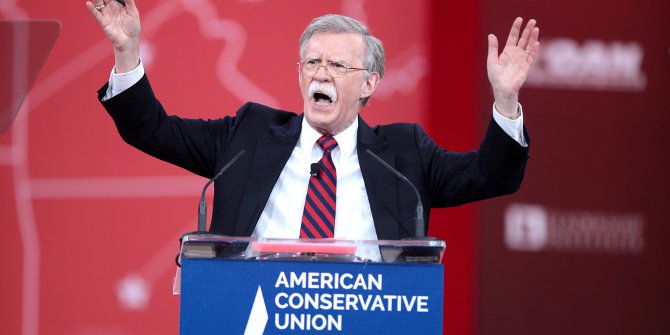
Latin America holds some of the world’s biggest oil reserves, but unstable political events in the region are hindering its potential, especially in Venezuela. Global U.S. security would benefit from a revamping of outdated policies towards Latin America, argue Andrés Cala and Michael Economides. This is a blind spot in American politics, one that threatens U.S. geopolitical and economic interests. In this book, the authors aim to offer a thorough analysis of key geopolitical and economic threats to the U.S., highlighting the need for a new Latin American policy doctrine based on military and strategic priorities. Reviewed by Luis Boscán.
 America’s Blind Spot: Chávez, Oil and US Security. Andrés Cala and Michael Economides. Continuum Books. 2012
America’s Blind Spot: Chávez, Oil and US Security. Andrés Cala and Michael Economides. Continuum Books. 2012
Despite economic woes in an increasingly multipolar world characterised by the ascent of countries like China, Brazil, India and Russia, Andrés Cala and Michael Economides argue that the United States ‘will remain the single most powerful country for some time’ (p. xix). The central argument of America’s Blind Spot is that a failed and outdated US foreign policy towards its south-of-the-border neighbours has hindered the achievement of energy security. With the world’s second largest crude oil reserves (largely untapped), the region is in the best position to supply an important share of US energy needs (p. 125). Why hasn’t this been the case until now? What would it take for this to change?
Andrés Cala, a Colombian journalist based in Madrid, and Michael Economides, a US-based energy analyst and Petroleum Engineering professor, have teamed up to produce a timely, well documented, yet concise examination of the issue. With a solid command of geopolitics and a clear understanding of petroleum economics, the authors present a valuable insight into the balance of power plays in Latin American politics, the role of the late Hugo Chávez in the region, and a detailed analysis of US energy policy to sustain the claim that ‘Venezuela is perhaps best placed to significantly improve American energy and national security in the short term’ (p. 81).
The tone of the book is set in the early pages, as Cala and Economides express advocacy for a more pragmatic, less confrontational and more strategic approach to foreign policy. Quoting Barack Obama, who addressed the centuries-old division between ‘idealists’ and ‘realists’ in US foreign policymaking during his Nobel Lecture, the arguments raised throughout the analysis focus on this distinction in which the former defend ‘American Values’ like freedom, human rights and democracy, and the latter fight for a stark defence of American interests.
According to Cala and Economides, the ‘idealist curse’ has strengthened rather than weakened America’s political adversaries in Latin America and has thus prevented a more constructive relationship for both sides. Take, for instance, the coup d’état that briefly overthrew Chávez in April, 2002, which the authors describe in some detail. While ultimate responsibility for the events and ensuing casualties remain unclear to this day, they remain part of a wider blame game between Chavismo and its opponents, though it is agreed by both sides of Venezuela’s political spectrum that the resulting de facto government disrupted the country’s institutional framework to such an extent that it was impossible for it to survive. Nonetheless, with the argument that the authoritarian Chávez attacked his own people and violated human rights, the Bush administration swiftly recognised the short-lived Carmona government, setting itself apart from the international community, which condemned the fact that a freely elected head of state had been forcibly ousted. Instead of weakening Chávez, the US stance backfired: after his return, Chavez had the perfect excuse to establish a tighter grip on power and to radicalise his socialist movement – which he promptly proceeded to do.
Such diplomatic blunders are the result of a mismatch between reality and stereotype. As Cala and Economides note: ‘When Americans think of their neighbours south of the border, most imagine a confusing mesh of Spanish-speaking banana republics and semi-feudal drug-trafficking states run by corrupt officials, despotic generals and rich hacienda owners enslaving poor and illiterate Mayas and Incas’ (p. 3). However, reality is different, with Latin America ‘simply transitioning from developing to developed, albeit with stark differences between Nicaragua and Costa Rica, for example, not to mention Bolivia and Brazil’ (p. 17) and ‘while risks and challenges will inevitably resurface, most of Latin America is moving toward consolidating around centrist, pro-market, social democratic models, with the exception of the Chavista block which opted for a statist model with various degrees of authoritarianism. But even this group will likely stabilize increasingly by seeking a more centrist policy, at least enough to attract foreign investment.’ (p. 17)
Readers acquainted with global oil will not be surprised that Venezuela appears in discussions about energy. After all, the Orinoco Oil Belt is one of the largest accumulations of recoverable oil in the world, and Venezuela comes second in total crude reserve holdings, right after Saudi Arabia. It has the second largest reserves of natural gas in the Western Hemisphere and it is the third largest supplier of petroleum to the US.
Given the highly confrontational climate of US-Venezuela relations in recent years and the concurrent developments in the North American Oil and Gas Industry, it is surprising to read that Venezuela ‘… could be, perhaps more so than any other country in the world, and certainly in the continent… the silver bullet for oil markets and indirectly for US energy security.’ (p. xxxii) Firstly, the United States has managed to completely transform its energy sector in recent years. Not only has its Oil and Gas resource base experienced the largest upward revisions ever, thanks to the application of horizontal drilling and hydraulic fracturing, but production is already booming. Adding Canada to the picture, ‘America’s closest ally in just about every respect, including energy’ (p. 118), sets the stage for a major transformation of global petroleum markets. In fact, a recent report suggests that ‘starting this year, North American output should start to have a tangible impact both on global prices and trading patterns, and will eventually turn the global geopolitics of energy on its head’.
On the other hand, following the PDVSA strike of 2002-2003 which, among other things led to the televised firing of 18,000 workers (approximately 40% of its total workforce) by Hugo Chavez, the once highly respected Venezuelan National Oil Company (NOC) gradually started to lose its credibility as a reliable supplier. Decreased accountability, reduced availability of technical expertise, on-going use of the company for political purposes and escalating debt have left its reputation significantly diminished. Even so, it maintains its status as one of the largest NOCs in the world and still makes a crucial contribution to the Venezuelan economy, which is more dependent than ever on PDVSA: petroleum revenue accounts for at least 93% of total export revenues.
All in all, America’s Blind Spot is a very interesting read, one that recounts many recent events and makes interesting points, but for its main hypothesis to be proved, far too many ‘ifs’ would need to be satisfied – the most significant of which is political change in Venezuela: Chávez might be dead, but his legacy is not – a point emphasized elsewhere by Economides.
Please read our comments policy before commenting.
Note: This article gives the views of the author, and not the position of USApp– American Politics and Policy, nor of the London School of Economics.
Shortened URL for this post: http://bit.ly/16L7kBf
———————————————————————
Luis Boscán is PhD fellow at Copenhagen Business School’s Department of Economics and his thesis focuses on mechanism design applied to flexibility trading in electricity markets. Luis holds an MSc in Systems Modelling & Simulation (Universidad de Los Andes, Venezuela) and an MSc in Energy Economics and Policy (University of Surrey, UK), which he completed with the support of a Chevening Scholarship. Prior to beginning doctoral training, he worked for six years as Economic Analyst at the Central Bank of Venezuela, where a substantial part of his activities was devoted to the analysis of international petroleum markets. He tweets at @luisraboscan. Read more reviews by Luis.






